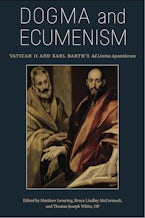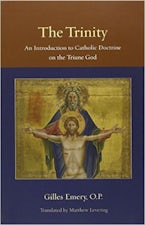Preparing your PDF for download...
There was a problem with your download, please contact the server administrator.
The Achievement of Hans Urs von Balthasar
An Introduction to His Trilogy
Foreword by Cyril O'Regan
Imprint: Catholic University of America Press
In The Achievement of Hans Urs von Balthasar, Matthew Levering has written a book for theologically educated readers who mistrust von Balthasar or who mistrust von Balthasar’s critics. The book shows that von Balthasar’s critics can and should benefit both from the rich and wide-ranging conversations that mark his trilogy and from the critical and constructive engagement with German philosophical modernity offered by the trilogy. In addition, Levering hopes to show that those who mistrust von Balthasar’s critics need to be more Balthasarian in their response to criticisms of the Swiss theologian.
In this introductory volume, the focus is on the first volume of each part of the trilogy. This approach exhibits the main lines of von Balthasar’s trilogy in a way that allows for an introductory volume of manageable size. This approach also avoids the more controversial volumes of the trilogy. Reading von Balthasar with the goal of engaging his more controversial views is certainly justifiable, but in an introductory book, the danger is that some readers could miss the forest due to their opposition to some of the trees.
The Achievement of Hans Urs von Balthasar contributes to the healing of the internecine conflicts that, since the 1930s or earlier, have pitted Ressourcement theologians and Thomistic theologians against each other with grave consequences for the health of Catholic theology. Despite sharing a strong belief in the faithful mediation of divine revelation through Scripture and the Church, many Catholic theologians today find themselves at loggerheads with each other. Easily forgotten by the Ressourcement and Thomistic combatants is their shared commitment to the theo-aesthetic beauty, theo-dramatic goodness, and theo-logical truth of Christ’s revelation of Trinitarian self-surrendering love as our source and supernatural goal, and their shared rejection of philosophical modernity’s immanentism, historicism, and power-centered voluntarism. The present book seeks to highlight these shared commitments, while leaving room for disagreement about von Balthasar’s specific positions and approaches.
Matthew Levering is the James N. and Mary D. Perry Jr. Chair of Theology, Mundelein Seminary.
"Flawless and clear writing, with a streamlined and perspicacious structure. The tripartite theme is unique and offers one of the most teachable ways into von Balthasar’s theological legacy. A prize for students and teachers alike."
~Adam G. Cooper, John Paul II Institute for Marriage and Family, Australia
"Levering's book is characteristically lucid and generous in its presentation of Balthasar's robust Catholic theological response to certain major philosophers of modernity. This indeed is one of Balthasar's greatest achievements, and I am glad to have such a wonderful treatment from the skillful mind of Matthew Levering. In a secularized intellectual milieu where the postmodern legacies of Kant, Hegel, and Nietzsche remain dominant, Levering's careful study of Balthasar offers Catholic scholars a great gift. Levering's reading of Balthasar models a renewed and expanded style of Thomistic theology in which the goal is not only to retrieve Aquinas's teachings but also to imitate Aquinas's critical engagements with the philosophical currents of his day. Levering enlists Balthasar in this enterprise and does so with clarity and grace."
~Andrew Prevot, Boston College
"Levering has provided us with a profound appreciation of Hans Urs von Balthasar's theology written by a Thomist fellow traveler, a vision of Balthasar's trilogy marked by both warranted irenicism and critical verve. His constructive proposal for the future of Catholic theology is both significant and promising."
~Thomas Joseph White, OP, author of The Light of Christ: An Introduction to Catholicism
"The work quite helpfully and compactly presents the thoughts of these philosophers and puts them into a Christological critique through a systematic survey of each introductory volume in the trilogy. Levering achieves much in a short book. It shows his own erudition, charity, and being like St. Thomas who sought to clearly convey the thought of others in order to find the truth."
~Journal of Interdisciplinary Studies











